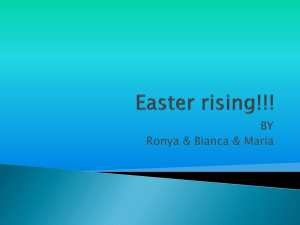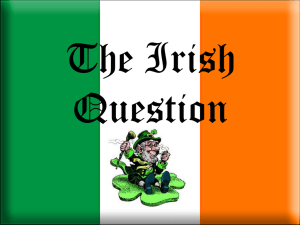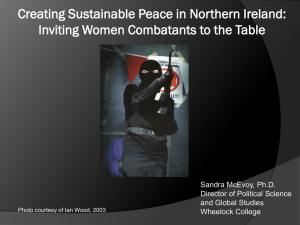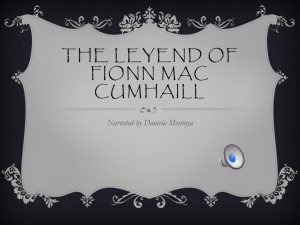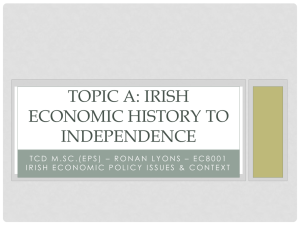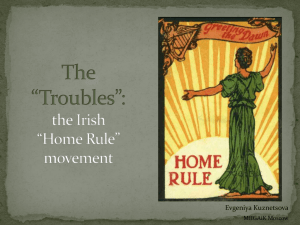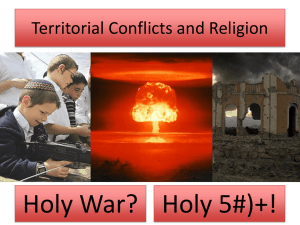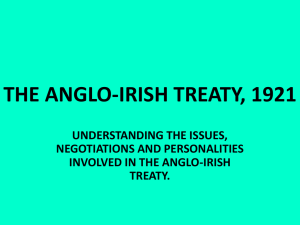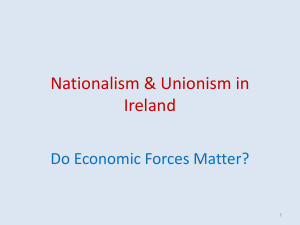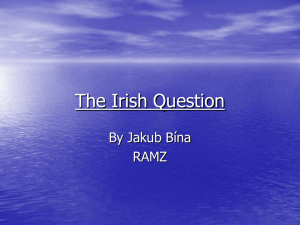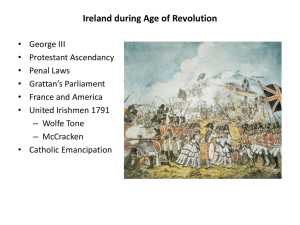N.-Ireland-1979-19851
advertisement
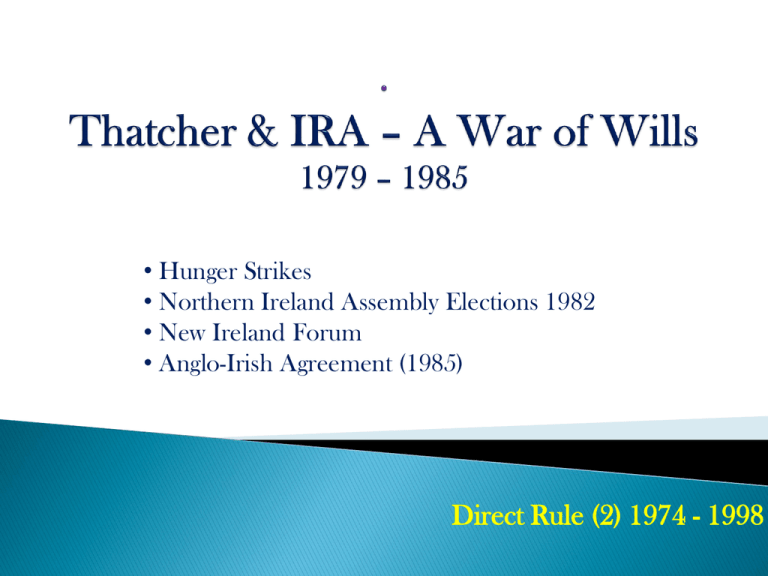
• Hunger Strikes • Northern Ireland Assembly Elections 1982 • New Ireland Forum • Anglo-Irish Agreement (1985) Direct Rule (2) 1974 - 1998 Right – wing Conservative Strongly Pro-Empire (Commonwealth) Strong supporter of Reagan’s Foreign Policy Strong supporter of armed forces and rule of law Successfully fought Argentina over Falklands Islands in 1982 Pursued a policy of aggressive military action in Northern Ireland – SAS & increased army deployment. “This lady’s not for turning” “Our revenge will be the laughter of our children” Bobby Sands “Ulsterisation’ policy was becoming successful in Northern Ireland. IRA demoralised due to proactive social and economic policy of Roy Mason. General public will for peace was growing. Roy Mason’s ‘criminalisation’ of IRA prisoners coupled with release of internees undermined recruitment in IRA. Prevention of Terrorism Act (1974) coupled with ‘Ulsterisation’ and socio-economic policy was stabilising Northern Ireland in basic security terms. However, it did not in any way address the Unionist domination of political, social & economic life. Status quo still remained – Direct Rule. IRA seized on the ‘criminal status’ of IRA prisoners as a platform for popular protest. Blanket Protest Prisoners refuse to dress in prison clothes/uniforms. Dirty Protest Prisoners refuse to wash or use toilet facilities. Hunger Strike (1) Hunger Strike (2) 27 October - 18 December 1980 1 March - 3 October 1981 1980 Strike ordered by IRA – eventually families intervened and asked them to stop 1981 Strike was independently taken – led by Bobby Sands and then followed by others 9th of April 1981 – Bobby Sands elected to Westminster as MP 5th of May 1981 – Bobby Sands dies on hunger strike after 66 days Ten IRA prisoners died on Hunger Strike in 1981 Bobby Sands was successfully elected on 9th April 1981 as MP for Fermanagh & South Tyrone constituency. “We are not prepared to consider special category status for certain groups of people serving sentences for crime. Crime is crime, it is not political.” - Margaret Thatcher, 21 April 1981 “I am a political prisoner because I am a casualty of a perennial war that is being fought between the oppressed Irish people and an alien ... regime that refuses to withdraw from our land.” - Bobby Sands, Day 1 of Hunger strike - - “Yielding to coercion would provoke further coercion and encourage more young people to follow the path of violence.” - Margaret Thatcher, 15th of May 1981 “You have got your pound of flesh, now give us our rights. Do not for one minute think that we are going to allow you to rob us of our principles. There are more Bobby Sands in these Blocks and we will continue to die if need be to safeguard these principles.” - Republican Prisoners’ Statement, 6th of May 1981 “The Irish patriots are in the process of writing one of the most heroic pages in human history.” - Fidel Castro, 19th of September 1981 “We have no right to destroy the beautiful gift of God’s life, so any way of destroying that gift is a violence. I see many people dying of hunger because they don’t have a decent chance to eat. I see people who are hungry because they haven’t got food, but I’ve never dealt with people who are hungry because they chose to be hungry.” - Mother Teresa, 6th of July 1981 “Unfeeling inflexibility will achieve nothing but more deaths.” - Edward Kennedy, 15th of May 1981 “It is not those who can inflict the most, but those who can suffer the most who will conquer” - Terence MacSwiney (Sinn Féin), inauguration speech as Lord Mayor of Cork, 1920 Republican ideology perceived itself as the highest form of national identity. As a result, it was considered that no sacrifice was too great for the achievement and protection of that national identity. Combined with often intransigent colonial forces resisting and blocking that nationalist expression, Republicanism often employed the ‘last resort’ of emotional war. The attempt was to underline the willingness of individuals to fight to the death, even using their own bodies as a weapon of demonstration. It hoped to achieve an increase in support amongst its own people, while simultaneously demoralising the political support of its’ enemies amongst their own people. The hunger strike of 1981 had very important and far-reaching consequences for Northern Ireland and proved to be one of the key turning points of ‘the Troubles’. The Republican movement had achieved a huge propaganda victory over the British government and had obtained a lot of international sympathy. Active and tacit support for the Irish Republican Army (IRA) increased in Nationalist areas. Political support for Sinn Féin (SF) was demonstrated in two by-elections (and the general election in the Republic of Ireland) and eventually led to the emergence of SF as a significant political force in Northern Ireland. The British government’s fear that SF would overtake the Social Democratic and Labour Party (SDLP) as the main representative of the Catholic population of Northern Ireland was a key reason for the government signing the Anglo-Irish Agreement on 15 November 1985 Source: http://iisresource.org/Documents/HS01_Hunger_Strikes_Tbks_Tasks.pdf Impossible to defeat/counteract if personal will of Hunger Strikers was strong enough Demonstration of willpower = source of all political power Immeasurable opportunity for national & international publicity Platform & opportunity to expose and magnify any and all inequalities in region of conflict In Northern Ireland’s case, the impact was further heightened by the election of Bobby Sands as MP to Westminster. It demonstrated that Republicanism, even militant Republicanism, clearly had a very real political mandate from the people. Stagnation of political process Growth in IRA activity & support Fianna Fáil / Fine Gael disagreement on North New Ireland Forum 1984 Anglo-Irish Agreement 1985 Held in Dublin Castle Garret Fitzgerald (Taoiseach) launched the Forum after consultation with John Hume (SDLP) ”The New Ireland Forum was established for consultations on the manner in which lasting peace and stability could be achieved in a new Ireland through the democratic process and to report on possible new structures and processes through which this objective might be achieved” - New Ireland Forum Report (Preface) Involved all Nationalist Parties in Ireland, North & South. Involved Catholic & Protestant clergy. Individual Unionist delegates attended but no Unionist Party delegation was present. The Forum published it’s proposals on 2nd May 1984. It listed the preferences of the Nationalist Parties in order of preference: A single, all-Ireland state. A federal Ireland, north & south having their own local governments Joint authority by Britain & Republic of Ireland over Northern Ireland Charlie Haughey (leader of Fianna Fáil) ruled out Option 2 & 3. Margaret Thatcher dismissed all three proposals with “Out! Out! Out!” Irish Rationale British Rationale 1st official consultative role for R.o.I. in N. Ireland affairs Acknowledgement of Nationalist aspirations Representation and Protection of Nationalists by Republic of Ireland government? Necessary step to counteract international criticism of British policy in N. Ireland Consultation & Assistance from R.o.I. in combating IRA activity – police, army, legal system etc. Established Republic’s acknowledgement of the existence of N. Ireland state** (Articles 2 & 3 of Bunreacht na hEireann) Article 2 Article 3 “Pending the re-integration of the “The national territory consists of the whole island of Ireland, its islands and the territorial seas.” (aspirational) national territory, and without prejudice to the right of the parliament and government established by this constitution to exercise jurisdiction over the whole territory, the laws enacted by the parliament shall have the like area and extent of application as the laws of Saorstát Éireann and the like extraterritorial effect.” (effectual – legal clarification of Article 2) Article 2 1. “It is the entitlement and birthright of every person born in the island of Ireland, which includes its islands and seas, to be part of the Irish Nation. That is also the entitlement of all persons otherwise qualified in accordance with law to be citizens of Ireland. Furthermore, the Irish nation cherishes its special affinity with people of Irish ancestry living abroad who share its cultural identity and heritage” Article 3 “It is the firm will of the Irish Nation, in harmony and friendship, to unite all the people who share the territory of the island of Ireland, in all the diversity of their identities and traditions, recognising that a united Ireland shall be brought about only by peaceful means with the consent of a majority of the people, democratically expressed, in both jurisdictions in the island. Until then, the laws enacted by the Parliament established by this Constitution shall have the like area and extent of application as the laws enacted by the Parliament that existed immediately before the coming into operation of this Constitution.” 2. “Institutions with executive powers and functions that are shared between those jurisdictions may be established by their respective responsible authorities for stated purposes and may exercise powers and functions in respect of all or any part of the island.” Sinn Féin denounced the Agreement DUP & UUP both opposed the Agreement. Opposed the involvement of Dublin in Northern Ireland’s affairs. 100,000 attended the ‘Ulster Says No’ rally in Belfast A joint UUP-DUP petition against the Anglo-Irish Agreement was signed by 400,000 Unionists in Northern Ireland. Loyalist paramilitaries attacked RUC officers & intimidated about 500 out of their houses. Fianna Fáil Haughey publicly rejected the Anglo-Irish Agreement as simply “reinforcing partition” of Ireland Secretly, Haughey accepted it as a positive step forward.
